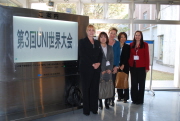The Best Practices in Work Life Balance in other countries

Like other unions in Japan, UI Zensen is fighting for work life balance for all workers but it has been facing difficulties especially in the retail and service sector in Japan, because of a trend of extending business hours. The UNI World Women’s Conference held in Nagasaki was a great opportunity to learn how both women and men are better able to balance work and private life in other nations, which are more “advanced in terms of work life balance”. Sis. Miho Arai and Sis. Asami Aoki, delegates of UI Zensen interviewed Sis. Therese Bryant and Sis. Barbara Nebart from Australia and Sis. Peggy Hessen Folsvik from Norway.
Miho was surprised about the cultural difference in the concept of holidays including Saturdays and Sundays and reminded that Japan lags behind in social infrastructure in terms of guaranteeing paid parental leave and securing alternate staff for workers on leave etc. In Japan many workers feel that taking longer leave may cause trouble to other colleagues in a workplace. She was also inspired by Therese who said that our life is not just for working but work is to enrich our life and that Saturdays, Sundays and holidays are for private life and social activities for all, including workers in the retail sector. In Japan, it is very hard to have consideration of private or family life in the workplace, and imagine that a husband takes a long vacation to accompany his wife on her business trip, but this is not extraordinary in Australia. More importantly, most workers can decide whether or not to work on public holidays and are not forced by their employers.
Peggy said in Norway many shops, except for small ones, are closed on Sunday regulated by law, but now her Commerce union is concerned as large commercial complexes which have small shops, are trying to get permission to open on Sunday. The managements also oppose this as it is expected that the staff costs will be increased by the holiday premium wages. “Don’t consumers wish to open on Sunday as it may be more convenient?” Miho questioned. Peggy clearly said “No. If they open on Sunday, not only sales staff but also deliverers and cleaners are required to work. They are consumers too.” Miho and Asami saw the light with very different and positive views of management and consumers in Australia and Norway!
Asami felt the need to change the minds of not only individuals’ but also of organizations and society in Japan, as Japanese people tend to give priority to their work and company’s interests over their private lives.
Barbara said that childcare leave benefits have been quite improved by the Labor Government in Australia. Paid parental leave is applicable to non-regular workers too, if certain conditions are met. In Norway, fathers are entitled to take 12 weeks paid paternity leave which has encouraged more fathers to do so. Barbara sent cheers to Japanese women citing a recent news article that “Ikumen” who actively take care of their children are increasing in Japan and underscored that it is important for the nations’ top leaders, including Ministers, to set themselves up as a good example.
Then, how will Japanese be able to break through in fighting against longer working hours, unpaid overtime work and “Karoshi”? Barbara pointed out that since major retail companies are very influential and socially responsible, they should be first to improve the way of working. Peggy also mentioned that this problem can not be tackled by only one company, therefore it is important for major retail companies to try to improve the business hours together, from the environmental viewpoint too.
Miho and Asami very much thanked Therese, Barbara and Peggy for their useful information, friendship and encouraging advice, which would drive them to take action for change and break through!

